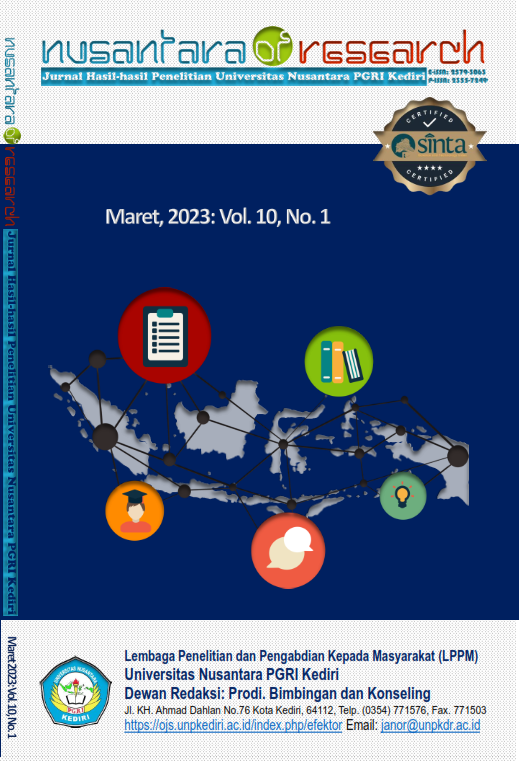The Effect of Self Efficacy and Social Support on Achievement Motivation of UNUGIRI Rugby Athletes
Main Article Content
Abstract
This research was conducted to determine the influence of self-efficacy and social support on the achievement motivation of Rugby athletes. The research sample consisted of 50 Rugby athletes from the UNUGIRI Student Activity Unit. The author created the measurement instrument by referring to the components of achievement motivation by McClelland, measuring self-efficacy using the Physical Self-Efficacy Scale (PSE) by Rycman, and referring to the aspects of social support described by Sarafino. The results of the study showed that there is a significant influence of self-efficacy, social support, and demographic variables (gender and age) on the achievement motivation of UNUGIRI Rugby athletes. For further research, researchers can design studies using other research methods or using other relevant variables. For athlete managers, this study can be used as a reference to improve the achievement motivation of athletes by optimizing self-efficacy and social support.
Downloads
Article Details
Issue
Section
Authors who publish with this journal agree to the following terms:
- Copyright on any article is retained by the author(s).
- The author grants the journal, the right of first publication with the work simultaneously licensed under a Creative Commons Attribution License that allows others to share the work with an acknowledgment of the work’s authorship and initial publication in this journal.
- Authors are able to enter into separate, additional contractual arrangements for the non-exclusive distribution of the journal’s published version of the work (e.g., post it to an institutional repository or publish it in a book), with an acknowledgment of its initial publication in this journal.
- Authors are permitted and encouraged to post their work online (e.g., in institutional repositories or on their website) prior to and during the submission process, as it can lead to productive exchanges, as well as earlier and greater citation of published work.
- The article and any associated published material is distributed under the Creative Commons Attribution-ShareAlike 4.0 International License
How to Cite
References
Clarasasti, E. I. & Devi. J. (2017). Pengaruh kecemasan berolahraga terhadap motivasi berprestasi atlet bulutangkis remaja di klub J Jakarta. Humanitas Volume 1 Nomor 2 Agustus 2017
Equata. Z. K. (2012). Hubungan antara persepsi atlet Rugby junior pada program latihan dengan motivasi berprestasi. Universitas Sebelas Maret Surakarta. Skripsi
Fernandi, I. Miftakhul, J. (2013). Hubungan persepsi komunikasi interpersonal pelatih-atlet terhadap motivasi berprestasi pada atlet Hoki. Universitas Negeri Surabaya. Character. Volume 01 Nomor 02 Tahun 2013
Husdarta, J., S. (2014). Psikologi olahraga. Bandun: Alfabeta
Ibrahim, h. Amar, H. Muhammad, A. & Aerni. (2016). motivation climate, self- confidence and perceived success among stundent athletes. Procedia Economics and Finance 35 (2016) 503508
Khan, Z. Zeeshan, H. Naseem, A. & Sartaj, K. (2011). Sports achievment motivation and sports competition anxiety: A relationship study. journal of education and pratice ISSN 2222-1735, Vol 2, NO 4, 2011
Komarudin. (2016). Psikologi olahraga. Bandung: Remaja Rosdakarya
Mc.Clelland, C. D. (2015). Human motivation. New york : Cambridge University Press
Mylsidayu, A. (2015). Psikologi olahraga. Jakarta: Sinar Grafika
Primita, H. Dyah, A. (2014). Hubungan antara motivasi berprestasi dengan burnout pada atlet bulutangkis di Purwokerto. PSYCHO IDEA, Tahun 12. No.1, Februari 2014 ISSN 1693-1076
Rahayu, E. Olievia, P. (2015). Hubungan antara goal-setting dan motivasi berprestasi dengan atlet renang. Character. Volume 3 Nomor 2 Tahun 2015
Slavin, Robert E. (2011). Psikologi pendidikan: Teori dan praktik. Edisi Kesembilan. Jilid 2. (Penerjemah: Marianto Samosir). Jakarta: PT Indeks
Suraya, Wan H. , & Madya. (2017). Self Efficacy and academic perfomance of secondary schools students in perak: an exploratory oulook. International Journal of Academic Research in Progressive Education and Development. 20017, Vol. 6, No. 3 ISSN: 2226-6348
Surbakti, M. (2008). Self efficacy pada atlet berprestasi (studi kasus). Universitas Gunadarma.Skripsi
Wicaksono, J, A. Hermien, L. (2013). Hubungan self efficacy dengan ketepatan free throw pada pemain national basketball league klub cls knights. Universitas Negeri Surabaya. Character, Volume 01, Nomor 02, Tahun 2013
Zhang, Ze-Ju., Chuan-Lin, Z., Xian-Geng, Z., Xiang-Min, L., Hui, Z., Jing, W., Shuang, L. (2015). Relationship between self-efficacy beliefs and achievement motivation in student nurses. Chinese Nursing Research 2 (2015) 67-70




